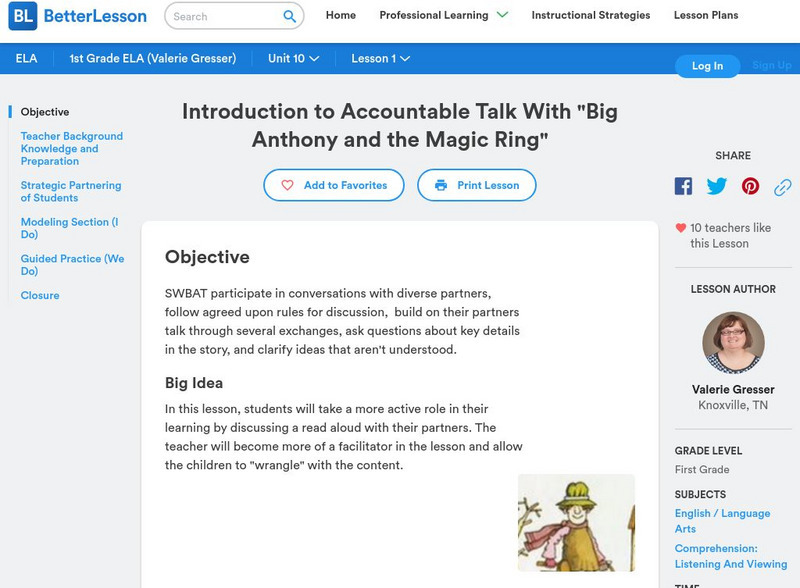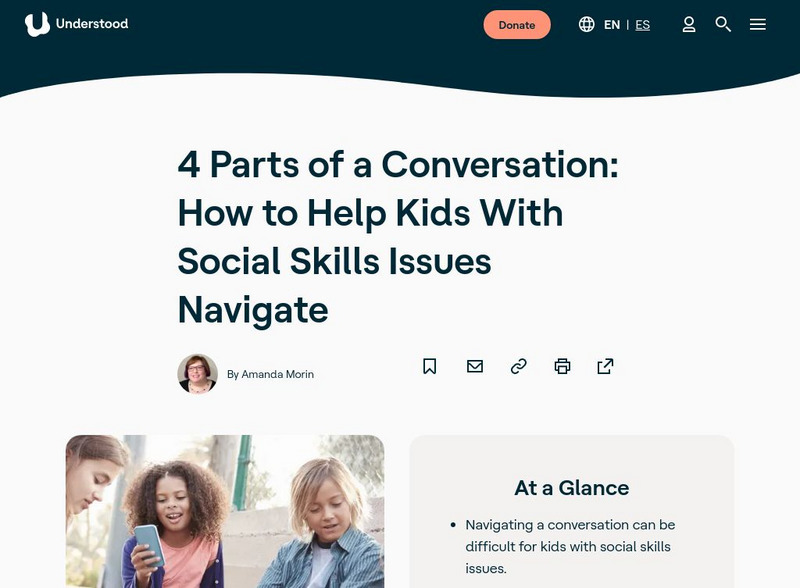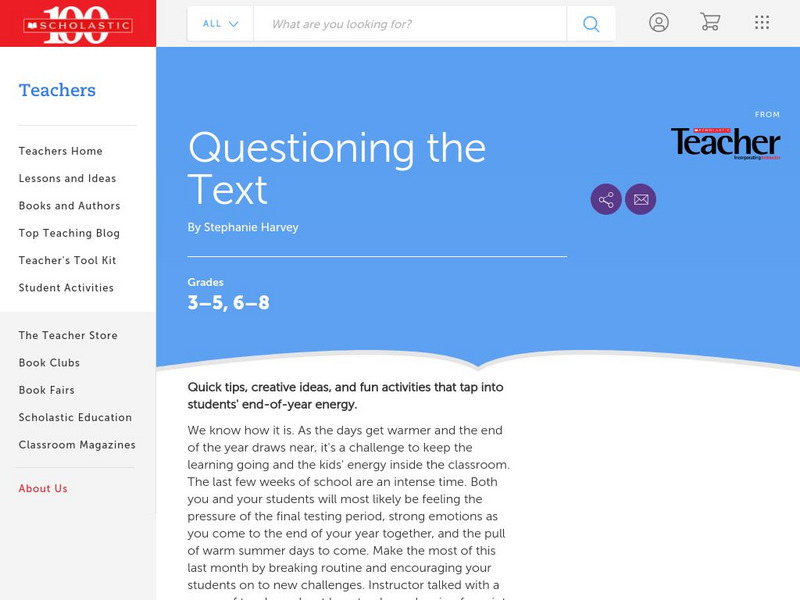Better Lesson
Better Lesson: Introduction to Accountable Talk
In this lesson, students will take a more active role in their learning by discussing a read aloud with their partners. The teacher will become more of a facilitator in the lesson and allow the children to "wrangle" with the content.
ReadWriteThink
Read Write Think: Choosing Clear and Varied Dialogue Tags: A Minilesson
Contains plans for one 50-minute instructional activity that teaches about using dialogue tags like "he said" or "she answered." In addition to student objectives and standards, these instructional plans contain links to PDF handouts and...
Other
Interactivity Foundation: Guidebook for Student Centered Classroom Discussions
This downloadable guide includes strategies and best practices for supporting student-centered classroom discussions.
Understood For All
Understood: 4 Parts of a Conversation:how to Help Kids With Social Skills Issues
Navigating a conversation can be difficult for kids with social skills issues. Here's a look at the four parts of a conversation, the skills involved, and how to help your child navigate each one.
Better Lesson
Better Lesson: Shared Inquiry Discussion
Students learn to generate ideas with a clear focus in response to questions while participating in a shared inquiry discussion. Included are shared inquiry guidelines, and tips on discussing fiction and non-fiction books using this method.
Scholastic
Scholastic: Helping Young Children Express Themselves
We know that communication is central to the learning process. Communication can be specifically linked to the expanding skills of listening and speaking, as children connect to the reading and writing behaviors that characterize early...
Education.com
Education.com: Peer Conferencing 101
[Free Registration/Login Required] At the completion of this lesson, students will be able to use the peer conference format to provide feedback to a peer.
Other
San Diego County District Attorney: Communication
Teaching young people how to communicate effectively helps them maintain healthy relationships, resolve conflicts peacefully, excel in school, and eventually get and keep jobs. In these lessons, students practice different forms of...
Other
Centervention: Body Language Activities Using Telephone Game
In this activity, students will play the game of "Telephone" in two different ways. Students will first play "Telephone" with the traditional version of the the game and then only communicate via their body language.
Michigan State University
Michigan State University: Interventions for Reading Strategies: Qar Strategy
This Michigan State University site suggests three question-answer relationships strategies, rather than four, leaving out "author and you." Includes examples of each relationship, steps for teaching, and assessment.
Scholastic
Scholastic: Questioning the Text
In this magazine article originally featured in Instructor, the reading strategy called "questioning the text" is explained by the renowned literacy consultant and staff developer, Stephanie Harvey. The steps included for questioning the...
Other
Reading Educator: Question Answer Relationships
Based on the presumption that every teacher shares responsibility for teaching reading, this page offers a brief look at question-answer relationships, as well as suggestions for putting the strategy to use in the classroom.
ReadWriteThink
Read Write Think: Using Science Texts to Teach the Organization of Nonfiction
Contains plans for three lessons that use science textbooks to teach about the organizational features of nonfiction such as labels, captions, headings, and fonts. In addition to objectives and standards, this instructional plan contains...
Robin L. Simmons
Grammar Bytes: Subject Verb Agreement Power Point
Learn about subject-verb agreement and practice identifying correct agreement in questions that could be found on standardized tests.
Wisconsin Response to Intervention Center
Wisconsin Rt I Center: Pals [Pdf]
Classroom teachers will learn about Peer Assisted Learning/Literacy Strategies (PALS) an engaging instructional strategy for students. Teachers will learn how to implement PALS, understand how to measure progress with PALS, and find...
Other
Center for Teaching Excellence: Activities to Engage Students [Pdf]
This resource gives numerous strategies to engage students in different types of collaborative discussion.
ReadWriteThink
Read Write Think: Talking About Books to Improve Comprehension
This lesson is a conversation-starter! In this lesson, students learn about striking up deep-thought conversations and staying on topic in the form of a book talk.
Other
Literature Circles Resource Center: Teaching Students How to Discuss
Teachers are given strategies and hands-on approaches to help students prepare for a discussion and participate as active members of it.
Read Works
Read Works: Oral Histories
[Free Registration/Login Required] An informational text about the importance of listening to and writing about people's life stories. A question sheet is available to help students build skills in reading comprehension.
University of Colorado
University of Colorado: Active Listening
The site descibes what active listening is and provides some links for further study.
CommonLit
Common Lit: A Princess Who Can Tune an Engine
CommonLit.org is a wonderful resource to use in a Language Arts classroom. Each story or article is accompanied by guided reading questions, assessment questions, and discussion questions. In addition, students can click on words to see...
CommonLit
Common Lit: Everella's Want
CommonLit.org is a wonderful resource to use in a Language Arts classroom. Each story or article is accompanied by guided reading questions, assessment questions, and discussion questions. In addition, students can click on words to see...
Better Lesson
Better Lesson: W.3.1: Write Opinion Pieces on Familiar Topics or Texts
Links to 37 lessons that focus on skills within third grade reading standard W.3.1.
Better Lesson
Better Lesson: W.3.2c: Use Linking Words and Phrases to Connect Ideas
Links to 7 lessons and activities that build student skills in standard W.3.2c: Use linking words and phrases (e.g., also, another, and, more, but) to connect ideas within categories of information.

















